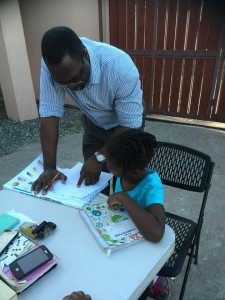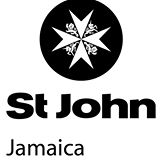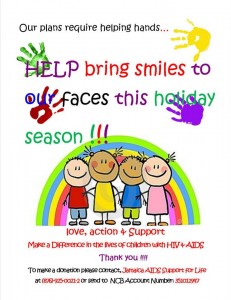
The “Forgotten Faces”: Children Isolated by HIV/AIDS
May 5th, 2015
People working in development agencies and non-governmental organizations (NGOs) tend to assign acronyms to groups of people they are seeking to support. So, here is one for you: OVCs.
OVCs are Orphans and Vulnerable Children, in case you did not know. Many children are vulnerable to a range of dangers these days. They need our care and protection. These vulnerabilities – obstacles to a happy, healthy and secure childhood – may be poverty, domestic abuse, crime and violence, stigma and discrimination or poor access to education. There are many children whose family cannot cope with the daily rigors of life, whose parents are absent – or who lives in a community divided against itself.
Health is a significant factor. The particular vulnerability we are discussing today is that of HIV/AIDS, which has serious impacts on a child’s physical, mental and spiritual wellbeing.
How many OVCs are there in Jamaica? In 2002 there were 10 to 20,000 Jamaican children at risk of losing parents or caregivers to the disease. By 2008, there were an estimated 20,000 HIV orphans in Jamaica. Despite considerable progress in mother-to-child transmission and a decline in new infections generally, there are still many children living with HIV/AIDS; sixty per cent of them are now twelve years old and over, and 96 per cent of them are on anti-retroviral drugs (ARVs), according to Jamaica AIDS Support for Life (JASL).
Clearly, it was time for Jamaica to take another look at the plight of these children; to see how they are doing. Sadly the picture is not encouraging; the children continue to struggle. Recognizing that more still needs to be done, the U.S. Agency for International Development (USAID Jamaica) has provided small grants to three Jamaican NGOs, implemented by World Learning after consultations with a Technical Working Group that included representatives from the Child Development Agency, the Ministries of Health and Education, the Planning Institute of Jamaica and UNICEF Jamaica, among others. The grants, totaling just over J$8 million (US$6,9997.76), are designed to boost support programs for children affected by HIV/AIDS. The grant signing and launch of the NGOs’ programs took place on May 5, 2015.
At the signing, World Learning’s Ruth Weller Jankee introduced the “newbie” among the three grantees: the Order of St John Jamaica/St John Ambulance Association of Jamaica, which recently celebrated 115 years of service to Jamaica but has an illustrious heritage going back nine centuries. Project Hope is St. John’s “birthday present to the children of Jamaica,” said Executive Director Alison Christie Binger. The organization plans to build a sustainable support and referral system through its network of volunteers, who will be trained along with a corps of volunteer counselors to reach the children’s needs, and those of their families. The approach will be “dignified, respectful and confidential,” said Ms. Christie Binger.
Now, we must consider a critical component of all three programs: psycho-social support for the children. What do we mean by this? Simply put, it is the devastating psychological effect of HIV/AIDS on a child who may be living with the disease or dependent on a relative or caregiver who is living with or who has died of AIDS. The child may have just lost the main bread-winner of the family. He/she may have had to move house; may have become homeless; or have been placed in state care. The family (key to a child’s security) may be in upheaval, unable to deal with such a crisis. The child may not be able to reveal his/her status at school, unable to get help from a guidance counselor. He/she misses out on education and feels isolated, friendless.
JASL’s Project Smiles, which has been in existence for some twenty years, serves 300 orphans and vulnerable children but is chronically short of funds. With its grant, JASL will implement a life skills program for 45 children aged ten to seventeen in Kingston and St. Andrew, St. James and St. Ann, to help them to cope better with their challenges. The program will include life planning, a career talk and creating vision boards, as well as the opportunity to socialize (yes, children need to socialize). JASL hopes also to provide financial support for some of the children, especially those who are not helped through the Government PATH Program.
Eve for Life Jamaica’s goal is specifically to empower and support young/teenage mothers living with HIV/AIDS and their children. Many of the children are missing out on their education, Eve observes; they are even afraid to go to school. “Non-disclosure of their status is a major issue,” observed Program Administrator Joy Crawford. The seven-year-old NGO aims to assist twenty children aged eight to ten years living with and affected by HIV/AIDS by establishing an after-school homework program; providing training in sexual and reproductive health and life skills; and offering opportunities for mentorship by older students (including e-mentorship through the GO-GSAT program)
Eve will also open its office as a drop-in center for the children to come and hang out, play together. Once again, Ms. Crawford emphasized, “A social space is very important. They need friends. All children need friends.” Relieving that isolation and improving self-esteem is as important as making sure the child adheres to his/her medication schedule. It’s about the child’s mental health and wellbeing.
“Children are forgotten faces in the HIV and AIDS response,” noted USAID Jamaica’s Project Management Specialist Dr. Jennifer Knight-Johnson. They “face extraordinary risks,” she added. The U.S. President’s Emergency Plan for AIDS Relief (PEPFAR), in partnership with Jamaica and many other governments and NGOs around the world, has been at the forefront of the fight against HIV/AIDS, committing billions of dollars globally to reduce transmissions and mitigate the impact of the disease since 2008.
“We all have hearts,” said Celia Christie-Samuels, Professor of Child Health at the University of the West Indies. Children are not adults, nor are they young adults, able to fend for themselves. Children are children. Adults must take responsibility for them. But where is the money going to come from, asked Eve for Life’s Joy Crawford, when there is so much need?
Of course we need more money, pointed out World Learning’s Ruth Weller Jankee. But people are also needed: volunteers, assistance in kind. People who will spend time with the children. This would go a far way to making them feel wanted, and loved. “Linkages” among partners also really help strengthen the response, Jankee reminded us.
It is this simple: “The children need us,” Acting Deputy Representative of UNICEF Jamaica urged at the signing. As a Jamaican child psychologist commented recently on Facebook: “Children need us to show up.” So, let’s do just that. And let’s not forget those children whose lives are deeply affected by HIV and AIDS. They need our time and our love, too.

Children need our time and attention too: Eve for Life Director Peter Crawford guides a young one. (Photo: Facebook)
Tags: Alison Christie Binger, children, children's rights, Eve for Life, HIV/AIDS, Jamaica AIDS Support for Life, Joy Crawford, NGO, orphans and vulnerable children, St John Ambulance Association of Jamaica, UNICEF Jamaica, USAID, World Learning
The Gleaner reserves the right not to publish comments that may be deemed libelous, derogatory or indecent.
To respond to The Gleaner please use the feedback form.
4 Responses to “The “Forgotten Faces”: Children Isolated by HIV/AIDS”
- We Are the Zoomers
- Living Online with Humans and Birds: NAOC 2020
- Human Trafficking and the Problem of Public Education
- Down Memory Lane
- Are We Ready to Recover from COVID-19?
- Road Safety Matters: Is Your Vehicle Safe?
- Sexual Harassment, Me Too, and the Minister’s Disturbing Giggle
- The Vulnerable Senior Citizens, Private Care Homes and COVID-19
- A Muddle Over Masks
- Here is Something Life-Saving You Can Do: Give Blood!





God bless each and every one of these little special babies. I urge anyone who has the desire to give of themselves to God and His children, anyone who wishes to volunteer and work with them, to consider working with these angelic little gifts. Believe me when I tell you that it will fulfill your life and change your perspective forever. God has placed them among us for a reason and they are Jamaica’s children, our children, so we have a duty to love and serve them.
Having worked with cannabis for years, I want to emphatically state to the people of Jamaica: Cannabis can completely control HIV, Kaposi sarcoma, and many non-viral cancers. The world will change as more cannabinoid activity becomes prevalent in functional humanity. It is only right that Jamaica, with its indigenous religious use of cannabis, lead the way into a more enlightened world’s future.
drbob
Since you have done a lot of research into this matter, I cannot really comment on the effectiveness of cannabis in fighting cancer and HIV. I am sure there are many studies to back up your opinion. As you probably know, Jamaica recently passed laws allowing for small amounts of ganja for personal use and our universities are researching medical applications. We shall see where that takes us!
Thanks so much for your lovely words. You expressed this so well. Yes, these little children are indeed gifts, and I would also encourage anyone with a love of children to volunteer and work with them. They deserve our love and protection.